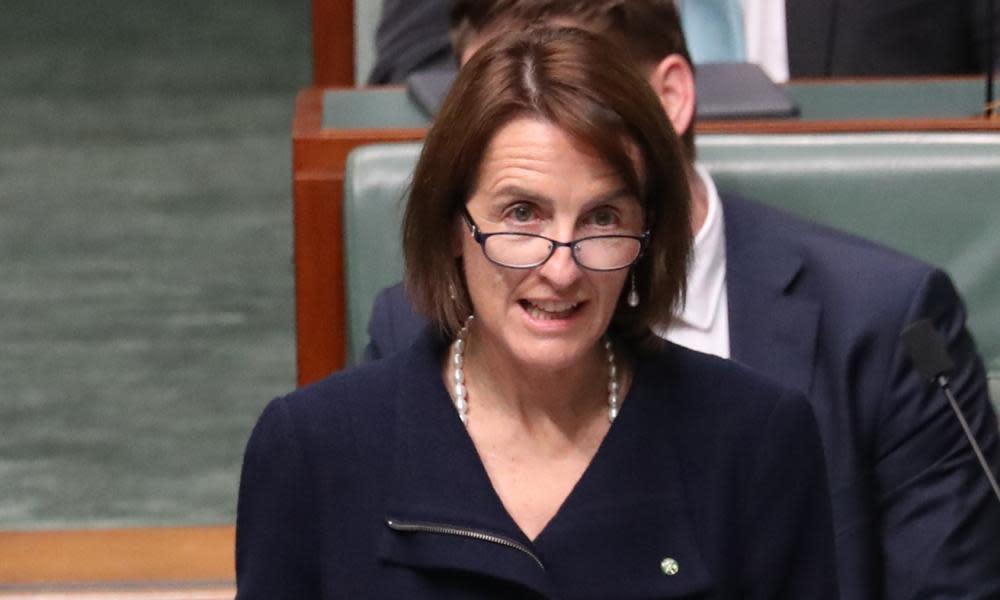‘It needs more work’: Liberal MPs call for tougher federal integrity commission

A growing number of Liberal MPs are pushing for the government to toughen up its proposed federal integrity commission, amid criticism from the crossbench and experts that the draft bill is too weak.
The prime minister, Scott Morrison, promised before the last election that the Coalition would legislate the commonwealth integrity commission in this term of government, leading to a draft of the bill to be released last November.
The CIC consultation draft bill has drawn criticism for the softness of its approach, described as a “toothless tiger” with insufficient power to stamp out and deter corruption.
Related: Anthony Albanese stands by branch stacking MP Anthony Byrne amid Ibac revelations
The new attorney general, Michaelia Cash, is to introduce the bill to the Senate before the end of the year, but a growing number of MPs are calling for it to beefed up beforehand.
The Liberal MP for the seat of Curtin, Celia Hammond, said she wanted to see changes made to the bill, and believes the government should also be open to negotiating with Labor and the crossbench to improve the proposal.
“I am in favour of a strong integrity commission that has teeth,” Hammond told Guardian Australia.
“Given that there is no perfect model and there is no one model out there, and lots of people have different views on this, if it doesn’t appeal to the crossbench or to the opposition or to others whose votes we need, the government should be open to having discussions with them.”
The Western Australian MP, a former academic and lawyer, said she believed public hearings should be included as part of the model, but only once a certain threshold was met.
The calls for the proposed model to go further comes as the Morrison warns against a New South Wales-style Icac in the wake of premier Gladys Berejiklian’s resignation, which he described as a “devastating” outcome.
Morrison said the federal model would have processes in place to “assume people are innocent before they are thought to be guilty”.
Hammond also called for the different treatment of politicians and law enforcement officials to be scrapped but suggested decisions on whether hearings were made public should consider the role of the person involved.
“I am in favour of public hearings, but I do think it needs to be sensible and have high thresholds in place,” Hammond said.
“There should be a public interest determination being factored in when you’re working out whether to make the inquiry public, so you’re weighing up both the potential damage, harm, the nature of the issue, the level of evidence that has already come to light, with the public interest in it being completely out in the open at that point in time.
“Even if something’s not held in public, and it’s held in private, there could also be a mechanism that the findings may be made public.”
While acknowledging that public hearings could be “weaponised” Hammond said this would be mitigated by having “a good sound threshold” in place.
She also said the government should consider adding a definition of corruption that addressed a “breach of public integrity”. The bill now limits the CIC to only investigating instances of “serious criminal conduct”.
The Liberal MP Dave Sharma, who represents the seat of Wentworth, said he also wanted to see changes to the bill, including scrapping the two jurisdictions that differentiated between law enforcement and politicians and other public servants.
“We’re better off saying, everyone’s subject to it and there’s certain thresholds that need to be met for certain things to happen – the level of seriousness of the conduct or alleged conduct being one of them,” Sharma told Guardian Australia. “So, I’d prefer if we have a single category.”
He also suggested the type of corruption be “broadened slightly” but warned against capturing “maladministration”, as some state anti-corruption bodies did.
Related: Bridget McKenzie defends regional grants that disproportionately benefited Coalition seats
“I would like to have a broader remit terms, but I am cautious,” Sharma said.
“I would prefer, to be honest, that we get a body up and running and then tweak or improve it over time rather than create something that has a whole lot of unintended consequences.
“We would like to see it strengthened somewhat, but are pragmatic enough to realise that the main thing is to get something done.”
Sharma said delivering the CIC in this term fulfilled the election commitment and also addressed a community concern – held “rightly or wrongly” – that corruption was going unchecked.
“I think it’s an important thing to restore some trust and integrity into the federal political system.”
The Liberal MP Katie Allen, who has already provided feedback to Cash on the draft bill, said the CIC should be able to initiate investigations and the definition of corruption needed to be tightened up.
She said she was comfortable that public officials and politicians were treated differently to law enforcement agencies but wanted to see the gap between the two narrowed.
“It needs more work, I don’t think it is acceptable where it is,” Allen said.
But she also cautioned against a “politicised body” that could be weaponised against public figures, saying some safeguards were needed to prevent it from “becoming a monster”.
The Liberal MP Jason Falinski said he also wanted to see some changes to the federal model but was “implacably opposed” to public hearings.
“I think there is room for improvement, but over and over again what we have found is that the cost benefit analysis of public hearings is way too far on the side of cost, and to protect the lives of innocent people they should not be allowed.”

 Yahoo News
Yahoo News 
